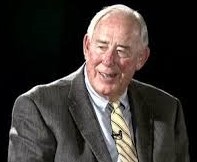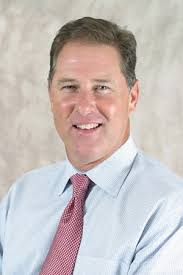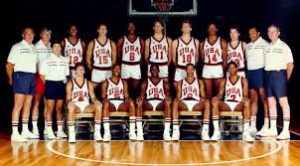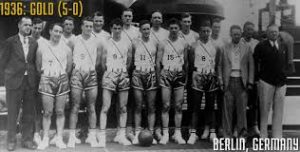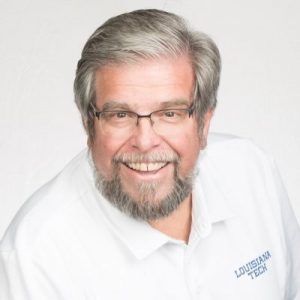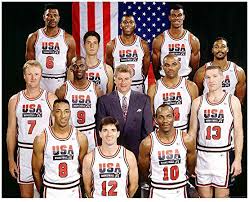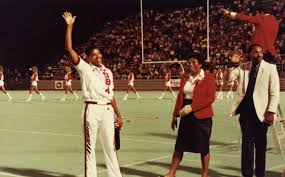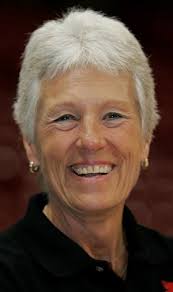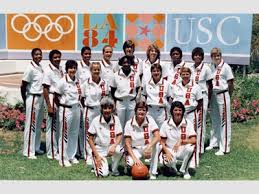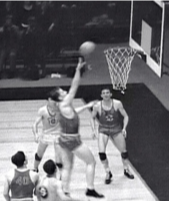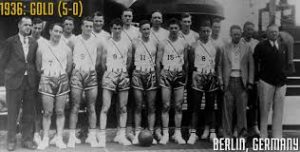The NBA Finals date back to 1947 (when they were known as the Basketball Association of America Finals) and the very 1st NCAA tourney was held in 1939. Olympic basketball competition is even older: it debuted as a demonstration event in 1904 and the men’s version became a medal sport in 1936, with the women finally getting their chance to go for the gold in 1976. The United States has dominated Olympic basketball competition from the start: the men have won 15 gold medals in the 18 tournaments they have participated in during the past 84 years, while the women have won 8 gold medals in the 10 tournaments in which they have competed during the past 44 years. Those of you who were looking forward to the 2020 Olympics opening ceremonies in Tokyo on July 24, 2020 will have to wait an extra 364 days, as the coronavirus caused a postponement until July 23, 2021. Due to the absence of college basketball since mid-March, HoopsHD’s Jon Teitel decided to fill the void by trying to interview as many prior Olympic players/coaches as possible so that you have something to read this summer while not watching the Summer Games. We continue our coverage by chatting with former Oklahoma State color analyst Tom Dirato and former player Jack Herron about Coach Iba winning back-to-back NCAA titles and becoming the 1st coach to ever win multiple Olympic basketball gold medals. Today would have been Coach Iba’s 116th birthday so we are proud to celebrate his memory.
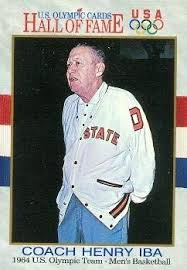
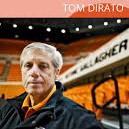
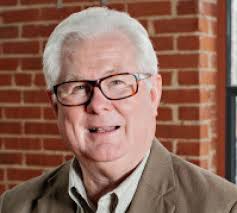
In 1925 the St. Louis Cardinals offered Iba a contract to play pro baseball (he turned it down because he could not hit a curve ball) and in 1926 he led the state of Missouri in scoring as a basketball player at Westminster College: which sport was he best at, and which sport did he enjoy the most? Tom Dirato: I am guessing basketball! Having talked to him on many occasions I know that he had a warm spot in his heart for baseball. Jack Herron: I called my close friend Moe Iba (Hank’s son) to ask him about this and he said even he did not know. His dad was quite an athlete in his day but his inability to hit the curve meant that he was not geared to pro baseball. He later coached baseball and even won a state title. He played basketball with several other legends including Wyoming coach Everett Shelton and the father of OSU 3-sport star Dick Soergel. In his very 1st year as basketball coach at Northwestern Missouri State in 1930 he went 30-0 thanks in large part to future Hall of Famer Jack McCracken. Many of his best players came out of junior college: he would have tryouts, bring in 200 players, and then keep the best ones around. My dad had to tryout in Stillwater and was packing up his car afterward because he thought that he did not make the cut until Mr. Iba told him to unpack. If you ask any of his former players they will tell you that what they admired the most was his discipline/integrity.
As head coach at Oklahoma A&M his teams were known for being methodical and controlling the ball, which often led to low-scoring games: why did he choose that offensive philosophy, and what made it so effective? TD: That was the style of play back in the day. His former player Eddie Sutton said that was just the way it went: there was no shot clock/3-PT shot so defense was certainly the priority. His practices were legendary as to how hard the team worked: they would go 3 times/day, which they cannot do anymore. They centered on man-to-man defense, rebounding, and the finer points of the game. JH: My dad played for him from 1940-1943. Iba received a lot of criticism for his style of play and he even wanted to speed it up himself. However, if we had the ball and a 1-PT lead then the other team was in trouble! Freshmen were ineligible during my era so we spent 6 weeks doing nothing but playing defense against the varsity. I have been around some of the best coaches ever including John Wooden/Bobby Knight. Coach Knight was the best at developing a game-plan but Iba was the best at controlling the ball. 2-time NAIA championship coach Bob Vanatta once said, “You might think that you can run against Oklahoma State…but if Mr. Iba does not want you to run then you will not run!” When classes were not in session we would have 3-a-days from 8AM to midnight with only a few breaks for meals: it was brutal. When I later got to reminisce with Hall of Fame coach Don Haskins about his time playing for Iba he said that the 1 thing he remembered was those 3-a-days. Girlfriends were a no-no but if you got married then they were okay: all of the players’ wives would say that he was the nicest man.
He was known as the “Iron Duke of Defense” and his “swinging gate” defense (a man-to-man with team flow) helped his teams lead the nation in scoring defense 16 times during his first 23 seasons in Stillwater: where does he rank among the greatest defensive coaches ever? TD: I would think right around the top. Other coaches in Stillwater have preached it, including disciples like Sutton. Mr. Iba founded it and it continues today. Bobby Knight said that he learned much of his philosophy from Henry, who was so demanding of his players. He was hard on his players and sometimes difficult to be around but he just wanted his players to live up to what he expected. JH: We led the nation in defense during my playing days due to ball control. Coach Tex Winter recruited me and we became great friends. We later lost to Tex when he was coaching Kansas State and we only took 40 shots: Tex said that any team that takes only 40 shots deserves to lose! We controlled how many shots were taken and did not change from that. The basis of our defense was to cover the point of the ball. As soon as an opposing player got the ball we would be “in his jock” and run him in certain directions. If the ball was on 1 wing then we would keep 1 foot in the lane on the other side of the floor so that we could “swing” our defense. I had to cover the best player on the other team for 64 games: I took pride in it…but you had better be in condition if you want to do that.
The Aggies made 3 NIT semifinals from 1938-1944, 6 Elite 8s in a 10-year span from 1945-1954, and became the 1st team to win consecutive NCAA titles in 1945/1946: how was he able to be so successful in the postseason for such a long period of time? TD: He would be the 1st to tell you that he had good players but his system was also important. When you showed up you knew what you would have to do. I do not think that his postseason success was a reflection of the time of year: they played hard all season long. The NIT was a big tournament back then because only a few schools made it. Most of his players said that they got better from the time they arrived on campus to the time they left. JH: He made 8 NCAA tourneys and was the 1st coach to make 4 Final 4s. Coach Knight made a point to befriend former coaches like Pete Newell/Iba and he said, “When the shadow is cast on basketball, the biggest shadow is Iba”. John McLendon was his scout who was sent all over the world to check out other teams and Coach Iba took in every word that John reported back to him. Mr. Iba invented the motion offense that was later used by Knight/Mike Krzyzewski. Dean Smith came to Stillwater to study our 4-corners offense back in the day: people think that Dean invented it but he learned it from Iba. Many of his former players who became coaches like Wilbur “Sparky” Stalcup later sent several of their own high school stars to play at Oklahoma State. He was a great coach of big men: when Bryant Reeves showed up to play for Eddie Sutton he was a work in progress but Sutton took those big-man drills and turned him into an All-American. A lot of the difference-makers on Iba’s teams were big/strong/tough guys who had returned from the war. When he scouted players, the most important thing he looked at was whether they were coachable.
He also spent many years as athletic director: how did he balance being a coach with being an administrator? TD: I was not here at the time but it could not have been simple. According to 1 story, he looked around as athletic director and surveyed the situation and decided that he would emphasize other sports besides football, but I do not know if that was indeed the case. I do not think that he ignored the football situation but that is the folklore and you still hear it today. JH: I got on the Olympic Committee after being successful as an Air Force coach. I got to reconnect with Iba in Dayton at the 1971 College All-Star Game. Only a person of Iba’s stature could get Oklahoma State into the Big 8: the revenue from football games made a world of difference. I grew up in Norman: if OU loses a game then the whole town goes into a depression. Iba’s theory was that he might not win a football title but the Cowboys could excel in all of the other sports (baseball/wrestling/etc.). The pressure of trying to fund all of those sports was tough on him as an athletic administrator.
It was rumored that he hated his in-state rival so much that he refused to set foot in Norman unless it was for a road game against the Sooners: how do you describe “Bedlam” to someone who has never seen it in person? TD: I am a big advocate of that after doing radio for 30 years! I do not know if it is as fierce now as it was 20-25 years ago but both schools want to come out on top. When I 1st arrived it was hot and heavy and the fire will never die down. It is more friendly now but I could see him saying that. I promise you that the juices are flowing. When the 2 schools tangle all bets are off but the intensity is off the charts. JH: Mrs. Iba would invite Curt Gowdy to dinner before he announced basketball games in Stillwater…and told him that she thought he was spending too much time covering OU football! I remember listening to 2 guys arguing about Bedlam back in 1975: in our state it is big. The most exciting basketball game you will ever go to is when OU comes to Gallagher-Iba Arena in front of 13,000 people. 1 of the best players at OU was Kenny Pryor, who was an All-American at Phillips 66 with Bob Kurland. Kurland came to Kenny’s funeral and toward the end of the service they had a band play “Boomer Sooner”: people would not believe it but I saw Kurland stand up for that! Iba was friends with OU basketball coach Bruce Drake so that rumor is absolutely false: Iba came to Norman to visit me several times. My dad’s blood was orange but he is in a famous picture of Kurland holding his hand 2’ above the rim: that photo was taken at Bedlam in Norman in 1943 and actually led the NCAA to create the goaltending rule.
He was the 1st coach to ever win multiple Olympic basketball gold medals (1964/1968): what did it mean to him to coach team USA? TD: He loved his country. We would shoot the breeze at practice and he would relate some of the stories. He coached his Olympic teams just like his college teams: there was no messing around. I thought that he was the perfect choice: a lot of our work ethic was embodied in what he brought to the team. JH: Hindsight is 20-20 but if I was in Munich then I wish he would have hustled the team into the locker room after they won it and then gone through World War III if necessary to keep the gold medal. He told me, “I was on the worldwide stage and I was representing the US: you have to remain civil/dignified so I could not have done that to the world”. Jerry Shipp was an AAU All-American who was on the 1964 Olympic team: he told me that before they took the court to face the Russians in the gold medal game Iba told him to shut out the best player on the opposing team…and he did.
In 1968 he was inducted into the Hall of Fame: where does that rank among the highlights of his career? TD: He was a very humble man but I am sure that he appreciated it. He was happier when 1 of his players/friends received an honor: it was not about him. I never got the impression that he was overcome by it but I am sure he was proud of being on that wall. JH: He was named to so many Halls of Fame and won so many awards but I do not think it was paramount in his career. Coach Wooden was so humble even though he was the 1st person to ever make the Hall of Fame as a player and coach. I know that Mr. Iba wanted to make the Hall of Fame but it did not define his legacy.
In the 1972 Olympic gold medal game his team had a controversial 51-50 loss to the Soviet Union after the clock was reset twice, which broke team USA’s 63-game winning streak since Olympic basketball debuted in 1936: what impact did that game have on his life (if any)? TD: I am sure that it stung but he never went into great detail about it with me. It would be hard to take for anyone, much less an intense competitor like Mr. Iba. We had the game won a couple of times but the referees kept giving the Soviets more chances. I am unsure if he ever got over it: we all felt that he was shafted. JH: The Air Force named me to the Committee due to my relationship with Mr. Iba. I wrote him a letter to see if he could get me into the Olympics. I also talked to 3-star Air Force general George Simler to see if he could help me out and he wrote a letter saying that I should be allowed to do whatever I wanted: he was my meal ticket! We held many phone calls and I traveled to meetings all over the country. I asked the head of USA Basketball why Iba was the only guy allowed to coach the Olympic team: he told me that the only person who all of the different entities (AAU/NCAA/etc.) could agree on was Iba! I did not want him coaching forever because the other countries were getting better: basketball had improved abroad while we were still using young college/AAU players so the talent level was tightening up. I think it was inevitable that the US was going to lose at some point. It also hurt us when some of the best players refused to come to the Olympic Trials. Spencer Haywood came out of junior college but saved us in Mexico City in 1968. If we could have gotten the best college players in America then I think we could have kept winning. We could not take some of the best ones because they had already signed pro contracts. I wish that Wooden would have been allowed to coach in at least 1 Olympics.
He was a 2-time national COY, his coaching tree includes many former players/assistants who became Hall of Famers (such as Larry Brown/Don Haskins/Bobby Knight) and the United States Basketball Writers Association award for the college basketball coach of the year is called the Henry Iba Award: what is his lasting legacy on the college basketball coaching profession? TD: Some of the giants in the business like Tom Izzo/Mike Krzyzewski have paid homage to him regarding how they approach the game both on/off the floor. Anyone who has had success can be traced back to Iba or 1 of his disciples. To mention his coaching tree is insufficient: he had an impact on so many people. He came around 1 day to watch Eddie coach: when he saw Bryant Reeves for the 1st time he said, “This boy is a project but he will be good because he has great hands.” We were talking about practice and he told me that he listened to me on the radio and then paid me the ultimate compliment: “You know the game and you know what you are talking about…but you talk too damn fast!” It was a long time ago but I will remember that forever. He had an intimidating presence but was such a kind/gentle person and a gem of a man. We loved to be around him and he is still dearly missed. JH: I was at the press conference when they introduced Eddie Sutton as head coach: Mr. Iba was in his 80s but showed up in a suit to welcome Eddie. He would stand next to me at practice and tell me how to move without the ball: I wondered how this old son-of-a-gun knew all of this stuff until realizing that he was the genius who had invented it! He was a great human being who would level with us about many things after our playing days: he always took the high road. We referred to him as “the Man” as in “You can lie to yourself and to God…but you better not lie to the Man”!

